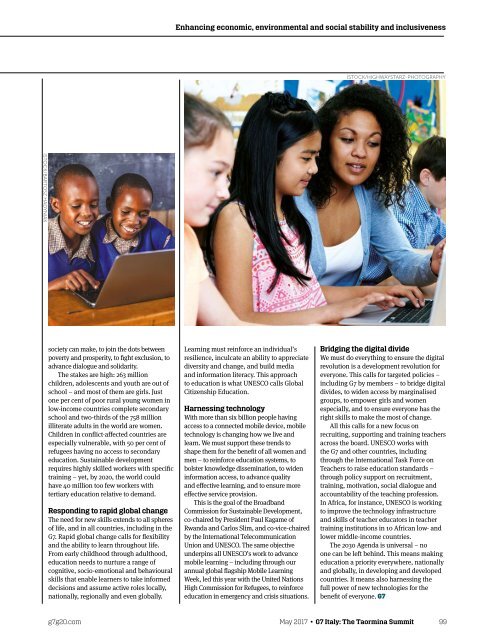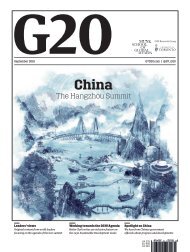G7 Italy-digi
G7 Taormina The 43rd annual Group of Seven (G7) summit, taking place in Taormina in Sicily, Italy, on May 26-27, 2017, will be an unusually important event. Its central participants, time, place, purpose and priorities will inspire it to act on the key issues that cannot be left alone for others later on.
G7 Taormina
The 43rd annual Group of Seven (G7) summit, taking place in Taormina in Sicily, Italy, on May 26-27, 2017, will be an unusually important event. Its central participants, time, place, purpose and priorities will inspire it to act on the key issues that cannot be left alone for others later on.
You also want an ePaper? Increase the reach of your titles
YUMPU automatically turns print PDFs into web optimized ePapers that Google loves.
Enhancing economic, environmental and social stability and inclusiveness<br />
ISTOCK/HIGHWAYSTARZ-PHOTOGRAPHY<br />
ISTOCK/BARTOSZ HADYNIAK<br />
society can make, to join the dots between<br />
poverty and prosperity, to fight exclusion, to<br />
advance dialogue and solidarity.<br />
The stakes are high: 263 million<br />
children, adolescents and youth are out of<br />
school – and most of them are girls. Just<br />
one per cent of poor rural young women in<br />
low-income countries complete secondary<br />
school and two-thirds of the 758 million<br />
illiterate adults in the world are women.<br />
Children in conflict-affected countries are<br />
especially vulnerable, with 50 per cent of<br />
refugees having no access to secondary<br />
education. Sustainable development<br />
requires highly skilled workers with specific<br />
training – yet, by 2020, the world could<br />
have 40 million too few workers with<br />
tertiary education relative to demand.<br />
Responding to rapid global change<br />
The need for new skills extends to all spheres<br />
of life, and in all countries, including in the<br />
<strong>G7</strong>. Rapid global change calls for flexibility<br />
and the ability to learn throughout life.<br />
From early childhood through adulthood,<br />
education needs to nurture a range of<br />
cognitive, socio-emotional and behavioural<br />
skills that enable learners to take informed<br />
decisions and assume active roles locally,<br />
nationally, regionally and even globally.<br />
Learning must reinforce an individual’s<br />
resilience, inculcate an ability to appreciate<br />
diversity and change, and build media<br />
and information literacy. This approach<br />
to education is what UNESCO calls Global<br />
Citizenship Education.<br />
Harnessing technology<br />
With more than six billion people having<br />
access to a connected mobile device, mobile<br />
technology is changing how we live and<br />
learn. We must support these trends to<br />
shape them for the benefit of all women and<br />
men – to reinforce education systems, to<br />
bolster knowledge dissemination, to widen<br />
information access, to advance quality<br />
and effective learning, and to ensure more<br />
effective service provision.<br />
This is the goal of the Broadband<br />
Commission for Sustainable Development,<br />
co-chaired by President Paul Kagame of<br />
Rwanda and Carlos Slim, and co-vice-chaired<br />
by the International Telecommunication<br />
Union and UNESCO. The same objective<br />
underpins all UNESCO’s work to advance<br />
mobile learning – including through our<br />
annual global flagship Mobile Learning<br />
Week, led this year with the United Nations<br />
High Commission for Refugees, to reinforce<br />
education in emergency and crisis situations.<br />
Bridging the <strong>digi</strong>tal divide<br />
We must do everything to ensure the <strong>digi</strong>tal<br />
revolution is a development revolution for<br />
everyone. This calls for targeted policies –<br />
including <strong>G7</strong> by members – to bridge <strong>digi</strong>tal<br />
divides, to widen access by marginalised<br />
groups, to empower girls and women<br />
especially, and to ensure everyone has the<br />
right skills to make the most of change.<br />
All this calls for a new focus on<br />
recruiting, supporting and training teachers<br />
across the board. UNESCO works with<br />
the <strong>G7</strong> and other countries, including<br />
through the International Task Force on<br />
Teachers to raise education standards –<br />
through policy support on recruitment,<br />
training, motivation, social dialogue and<br />
accountability of the teaching profession.<br />
In Africa, for instance, UNESCO is working<br />
to improve the technology infrastructure<br />
and skills of teacher educators in teacher<br />
training institutions in 10 African low- and<br />
lower middle-income countries.<br />
The 2030 Agenda is universal – no<br />
one can be left behind. This means making<br />
education a priority everywhere, nationally<br />
and globally, in developing and developed<br />
countries. It means also harnessing the<br />
full power of new technologies for the<br />
benefit of everyone. <strong>G7</strong><br />
g7g20.com May 2017 • <strong>G7</strong> <strong>Italy</strong>: The Taormina Summit 99
















